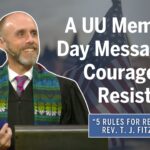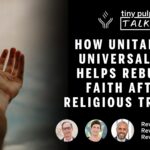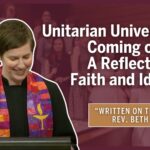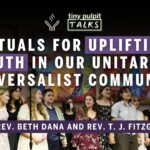Foundations: We Are The Ones We’ve Been Waiting For | Rev. Beth Dana | 09.01.2024
Sermon Transcript
The hands of the divine feature prominently in religious art and iconography across traditions and time. Think of Michelangelo’s famous fresco on the ceiling of the Sistine Chapel in which Adam’s hand and God’s hand reach toward one another, fingers almost, but not quite touching. Or think of the imagery in the Hebrew Bible in which God is a potter, shaping our lives. “All of us are the work of your hands,” it says in the book of the prophet Isaiah. In the Hindu tradition, many of the deities are depicted with 4, 6, 8, as many as 20 arms with hands outstretched or holding symbolic objects or shaped into hand signals called mudras. The many armed Hindu deities bring the stories and lessons of Hinduism to life, telling about their powers and their roles in the universe. For example, the God Shiva is often shown with a drum in one hand and fire in another, showing that he is both a creator and a destroyer.
The god Ganesh has four arms symbolizing four inner attributes, mind, intellect, ego, and conscience, and represents the soul that enables those four attributes to exist in us humans. In our church, one of the texts that we give to our ninth graders to consider during their coming of age year is these words from the Unitarian Universalist minister Christine Robinson, who says, “I invite you to remember that it is your hands who do the work of love in the world. These hands may hold another’s hands. These hands may type emails to politicians, sign cards of consolation and congratulation. These hands may patiently teach quilt works of beauty or write words urging peace. These hands may bathe children, feed elders, nurse the ill, work the earth, organize communities. These hands clasp in prayer, open in release, grasp in solidarity, clench in righteous anger. These hands are God’s hands, your hands, our hands, a great mystery of flesh and intention, a great potential of embodied love.”
I love these words because they remind me of you. I have seen your hands and your voices put to work for good, embodying the love that is the doctrine of our church and living it out in very tangible ways. A couple of months ago, I saw your hands come together to serve hundreds of families through the White Rock Center of Hope food distribution program. Some hands packed bags of canned goods, some hands arranged food on shelves. Hands formed a human chain to move heavy items from a walk-in fridge to the shelves, passing boxes from one set of arms to another. Some hands pushed carts through the pantry, gathering up items and being handed bags by others to put in the cart. Some hands greeted families as they arrived, directed them to pull their cars forward, unloaded the food into their cars and waved goodbye as they drove off.
And as the morning came to a close, hands grasped brooms to sweep the floor, broke down boxes, and wiped down shelves. In June, children at our summer camp here joined together in making a collective art project, which was then cut up into small flower-shaped pieces on which the children wrote their hopes for the world. The flowers were then applied to a large canvas with an outline of a dove surrounded by the words, “All people belong in this world.” Many little hands created this beautiful work of art, which is now over in the Hallman building. I’ve seen groups and classes and committees in our church create covenants together, everyone contributing their voice to the effort and then hands signing their names on the covenant, promising to be with each other in ways that allow us all to grow in harmony with the divine. And I’ve seen you join hands and Voices together at marches for women’s rights, marriage equality, the rights of immigrants and refugees, justice for black lives.
It’s powerful, so much more powerful than a lone preacher on a street corner. Hands clapping or waving in the air or clasped with others, voices raised, echoing chants to amplify their impact. Your hands and your voices shape our church community and they shape institutions, this one and many others that you are involved in. This is how we embody our Unitarian Universalist values and shape them into concrete lived realities. Going back many hundreds of years, our Unitarian Universalist tradition grew out of the radical Reformation in Europe. One of the defining ideas of the Protestant Reformation which made it such a departure from the dominant church of the time was what’s called the priesthood of all believers. That is it’s not the job of priests to be mediators between the people and God. “Each person can and must take responsibility for their relationship with the divine,” they said. Liberal religion of which Unitarian Universalism is apart took this further by proclaiming the prophethood of all believers.
It’s not the job of someone else to call out oppression and to challenge the powers that be. We cannot look to those that we label as prophetic leaders and abdicate our own responsibility. We are all called to be prophets in our own way. Over 300 years after the Reformation, Unitarian theologian, James Luther Adams articulated this idea and our responsibility in his essay on the Five Smooth Stones of Religious Liberalism, which we have been exploring these past few weeks here at church in our Foundations of Unitarian Universalism series. Adams wrote, “Religious liberalism affirms the moral obligation to direct one’s efforts toward the establishment of a just and loving community.”
He said, “It is this which makes the role of the prophet central and indispensable in liberalism.” He goes on to say that, “The holy thing in life is to participate in the processes that create justice for all.” By cooperating with the creative, sustaining, transforming realities of the universe, which some call God, we are making what he calls new channels for love and new structures for justice. Adams emphasized that bodily freedom and spiritual freedom are inextricably connected. The spaces in which we are working for justice with love are not above or separate from the messiness of the world. They’re not some ethereal thing. Rather, these communities take shape, as he says, in nature and history, and require freedom in both a material sense and a spiritual sense.
Biblical scholar and theologian, Walter Brueggemann whose work is focused extensively on the prophets of the Hebrew Bible talks about prophetic imagination and prophetic vision and what it means for us as regular people to respond prophetically to the world as we see it. He says that there are two elements of prophetic vision, criticality and hope. We must recognize and name the world’s pain and we must recognize and name the world’s possibilities. With a critical eye and a hopeful heart, we are best positioned to bring about change. James Luther Adams challenged all of us to embrace a prophetic imagination, to be prophets, to use our voices and speak up, especially when the powers that be are working against the establishment of a just and loving community.
He wrote this in the context of the mid-twentieth century, having seen the destructive power of Nazism and Fascism, the evils of racism and injustices of all kinds. He encouraged religious liberals to use our faith as a source of strength, to bend our institutions toward love and justice. It doesn’t happen without our voices and our hands continually bending and bending and bending, right? The final smooth stone of religious liberalism that Adams articulated and that we are exploring in this series was this. We deny the immaculate conception of virtue and affirm the necessity of social incarnation.
He goes on to say, “There is no such thing as goodness as such. Except in a limited sense there is no such thing as a good person, as such. There is the good husband, the good wife, the good worker, the good employer, the good lay person, the good citizen. The decisive forms of goodness in society are institutional forms. No one can properly put faith in merely individual virtue, even though that is the prerequisite for societal virtues. The faith of the liberal must express itself in societal forms, in the forms of education, in economic and social organization, in political organization. Without these, freedom and justice and community are impossible.”
In other words, good things don’t just happen because we are good people. Good people make good things happen by infusing goodness into institutions. As we’ve seen, institutions are really good at perpetuating systemic and cultural injustice, but they can also be social incarnations of goodness. The decisive forms of goodness in society are institutional forms and so the role of the church is to inspire and enable people to lend their voices and their hands to shaping institutions and molding history, to do something. To quote another of our religious ancestors, Henry David Thoreau, “Be not simply good, be good for something.” A few of us have that T-shirt. The church can help us live into this. We need one another to support our spiritual growth and we need one another to shape the communities of which we are a part into institutions that embody our values and put them into action.
As Nancy Shaffer, the author of our reading this morning said, “I believe no piece of good is ever lost. Everything offered toward good makes a difference.” Unitarian Universalists have always been about social incarnation. Our faith is not one that concerns itself with goodness and justice beyond this life or is concerned with salvation when we die. Nor are we concerned with individual purity and holiness. We believe that people are created good, inherently worthy and loved, not inherently sinful and depraved, and we are concerned with creating goodness and justice in this life. One of the primary ways that we do this is by harnessing the prophetic power and hope of individuals to bring about change in social institutions. Our Sunday Giveback recipient, the Texas UU Justice Ministry is a powerful example of how this works. We heard earlier from Reverend Aaron Walter, executive director of Texas UGM, about the work that they do to engage, empower, and equip Unitarian Universalists to advocate for our values in public policy and in the public square and to bend Texas toward justice.
Our financial support, of course, helps move this work forward, but it also requires our voices and our hands. It depends on the social incarnation of our values, so go vote this fall, friends. Please vote your values. Vote at the local, state, and national level to incarnate love and justice in our institutions from top to bottom and help others register and get out to vote too. We will have opportunities and it sounds like some of you have begun to write, “Get out to vote,” postcards right here at church to send to registered voters in our area. Prophets don’t just speak up, they act up.
As I reflected this week on the multi-armed Hindu deities, it occurred to me that the Five Smooth Stones of Religious Liberalism are kind of like our five arms, symbolizing our power and our role in the universe. They are a source of strength and tell the story of what is most important to us as Unitarian Universalists. Revelation is not sealed. We are a living tradition and thus we remain open to new truth, wisdom, and beauty wherever we may find it. We freely choose to be in relationship with one another. Mutuality and consent guide how we are together. As Reverend TJ preached, seeing other people wholly and fully, believing that people can work together to provide one another all that we need to thrive. We acknowledge the prophetic vision each of us brings to the world and we seek justice for all, joining our voices and hands together to make it so.
We believe that change isn’t just going to happen. We have to do something to make it happen. We have to harness the goodness of humanity and in cooperation with the loving and creative forces of the universe, bend and transform the institutions of which we are a part. And we strive to remain ever hopeful. Even in the face of gigantic hurdles, we know there are human and divine resources available to us for the achievement of meaningful change and this justifies an attitude of ultimate optimism. As we conclude this series on the foundations of Unitarian Universalism, I invite you to consider the Five Smooth Stones as promises that we make to ourselves and to one, another covenant that guides how we are together. Unitarian Universalist leader, Connie Goodbread describes covenant as “a vow of our hearts and staying at the table, a willingness to be transformed by the reality of others.”
To this end, she wrote her own set of vows based on James Luther Adams’ Five Smooth Stones, a covenant that she tries to live into every day. It goes like this. “With hope for a bright future, I come in trust. With love in my heart for all of creation, I come in humility. Seeking justice for all, marginalizing none, I come in open-mindedness. With courage, I come willing to be transformed with great joy, I come to bind myself to you, so that together we can do what I cannot do alone.” We can live these promises in the day-to-day and in how we create church here together and they will make us stronger.
The work of our hands and the words of our mouth will tell a story about what is important to us as Unitarian Universalists. It’s a good, powerful, and hopeful story, so let’s go out and tell it. Amen.








